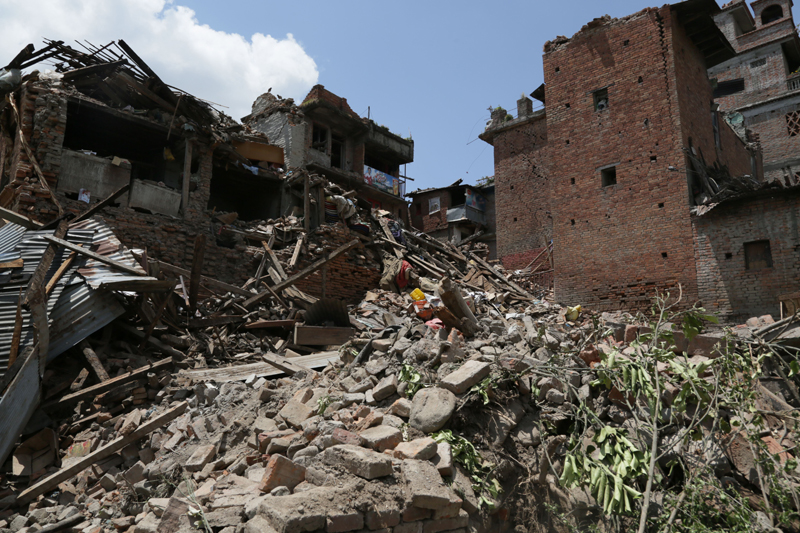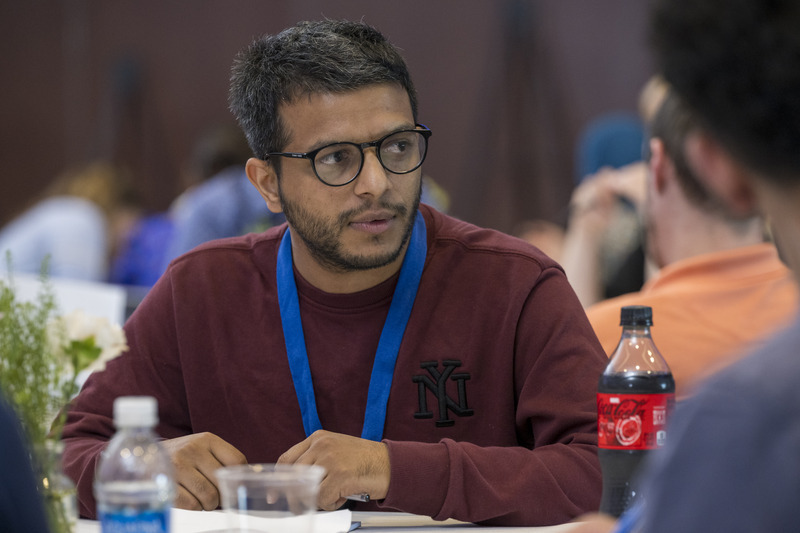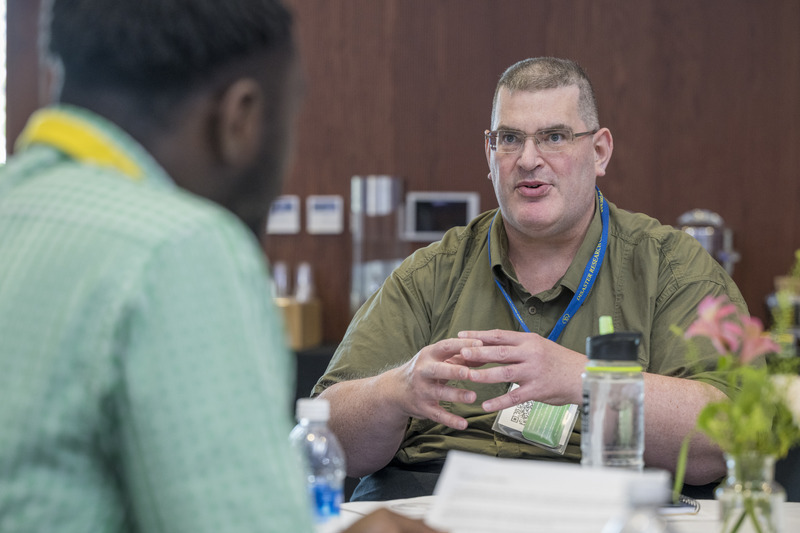


Planning now for the disasters of tomorrow
Photos by Kathy F. Atkinson and public domain August 09, 2024
Graduate students weigh priorities, resources and challenging global scenarios
Disasters know no boundary lines. Floods, earthquakes, wildfires, hurricanes, tornadoes, drought, conflict — they happen anywhere and everywhere on our planet. It’s why the University of Delaware’s Disaster Research Center (DRC) has a global reach, and it’s why that reach has global impact.
You could see both DRC’s reach and impact during a daylong workshop for graduate students, held during its 60th anniversary celebration earlier this year. The study and work those students were doing will help policy makers and leaders around the world prepare for disasters of the future.
At one table, for example, six students from five countries — Canada, Ghana, India, Nigeria and the United States — worked together on a planning exercise. Given a general scenario and location, how would they approach disaster research in that context? What would their priorities be? What resources could they anticipate? What challenges should they expect?
They would draw on their studies for this exercise and they would draw on what they heard earlier in the day from expert panelists, some of whom had been studying disasters for decades.
During a panel discussion on quick-response fieldwork, a student went to the microphone to ask a question. But first, he wanted to express a “hearty thank you” to Sarah DeYoung, a core faculty member of DRC, who was part of the panel.
DeYoung, associate professor of sociology and criminology, had deployed to Nepal after the 2015 earthquake that killed about 9,000 people and injured more than 20,000 others. Her focus was on maternal and child health and infant feeding after the earthquake.
Prabin Sharma wanted to acknowledge the impact of her work. Sharma, who recently earned his master’s degree in disaster management at the University of North Texas, was a survivor of the 2015 earthquake and wanted to thank DeYoung for the work she and other researchers had done on behalf of his nation.

He helped with response and recovery efforts after the earthquake, he said, and saw firsthand the challenges that arise in such conditions. Though he had never thought about disaster research before the earthquake occurred, he said he now hopes to pursue a doctorate in the field.
DeYoung said Nepal is close to her heart because it was the first major disaster she deployed to. It also was her first visit to a culture completely different from the West. She said she was surprised by the impact of the caste system as priority-of-care decisions were made.
Another focus of her research also is close to her heart — issues in evacuation for people with companion animals.
“People sometimes thank me and the students when we are in the field, mainly in my fieldwork on pets,” she said. “They say things like, ‘Thank you for caring about the animals’ and oftentimes people are appreciative of being able to share their own stories of surviving a disaster.”’
Hearing from experts who have encountered disaster conditions and the complications that come with such crises gives students much to consider as they pursue their own research.
“Exercises like this enable students to interact with a wide variety of experts who have used quick-response fieldwork and other methods in a variety of different disasters,” said Jennifer Trivedi, assistant professor of anthropology at UD, a core DRC faculty member and co-chair of the workshop. “This not only helps students learn from experts, but also lets them interact with those experts in a smaller setting, ask them questions and learn from them as the students apply their own knowledge, skills and experiences to a disaster scenario.”
The value and challenges of quick-response research
DRC faculty and students don’t go to disaster zones with the same mission as those providing medical relief or humanitarian assistance. They go to gather information, record data and narratives, and observe with a researcher’s disciplined eye so that future plans and operations can be developed using the best possible information and methods.
Their focus is on the future of disaster planning and response.
Among the first questions researchers consider after a major disaster is whether it is necessary to be there in person.
“Is there something unique to learn?” said Tricia Wachtendorf, co-director of the DRC. “Is my team the best suited to learn that information? Is there something that has been ignored, something that has changed or is different? Are we the right people to do this? Do we have the expertise? Is it something we already are looking at?
“We want to make sure the deployment is most helpful and that we are the best people to do it.”
The objectives of quick response are many — gathering perishable data, observing, listening, creating relationships and collecting documents and records for future reference are all important and may not be possible later.
“Fieldwork is also instrumental in understanding community impact, inequities and inequalities,” DeYoung told students.
The data may be meaningful to researchers from other disciplines. Wachtendorf recommends daily debriefings for the whole team. All may be exhausted by the end of the day, but she recommends turning on a recorder and capturing the team’s experiences and observations.
“You are seeing different things,” she said, “and if you’re from different disciplines you are going to see different things. Even when you’re exhausted, talk to each other for another hour. You’ll forget it the next day.”
Better data for better decisions
Gathering information and data helps researchers identify patterns and effects of choices that can help to inform future policy and planning.
One ongoing question disaster researchers face, for example, is how to persuade those in the path of a coming disaster — a hurricane, for example — to evacuate. When should such a message be delivered? And what kind of information makes that message most persuasive?
That question was part of the conversation around the table that had students from five nations.
It’s part of what Emmanuel Olamiriki, a master’s student from Nigeria, has been studying. His research focuses on climate variability and its impact on coastal flooding and aims to develop a climate model for accurate climate prediction.
Christopher Alegbeleye, also from Nigeria, is part of the Coastal Hazards, Equity, Economic prosperity and Resilience (CHEER) Hub at UD. He has been studying the increasing reliance on mobile homes in coastal areas. Predicting hurricane damage in such areas is crucial for decision makers and policy makers.
“You need me,” Olamiriki said with a smile.
Others at the table included Nii Otu Tackie-Otoo, a civil engineering student from Ghana, who is working on validation of models using actual loss data drawn from insurance claims, Utkarsh Gangwal, a civil and environmental engineering doctoral student from India, who studies critical infrastructure, and Tom Beveridge, a graduate student from Nova Scotia, who brought a first-responder’s perspective to the discussion.

Together, they discussed possible research responses to several scenarios presented to students during the afternoon workshop.
They talked about whether they needed to travel to the site, and, if so, how many researchers should go, where they would stay, how long they would stay, what kind of budget they might have, supplies they would need, transportation options, emerging technology and how to communicate onsite. They talked about supply chains, how disasters affect access to critical resources and how things change dynamically in the field.
“You can see why it has to be an interdisciplinary field,” Alegbeleye said.
Emerging technologies — geographic information systems (GIS), drones, artificial intelligence, cybersecurity — all are new areas for disaster management, too, Beveridge said.
Strategies and considerations
The best strategies for navigating disasters are constrained by many variables. And those variables and strategies are exactly what DRC researchers have been studying for the past 60 years.
Expert panelists discussed the importance of ethical considerations during onsite disaster research and the need to be an observer, while also recognizing there might be times when providing assistance — directly or indirectly — is necessary.
Jenniffer Santos-Hernandez of the University of Puerto Rico-Rio Piedras was a sociology graduate student at DRC while she was deployed to shelters after Hurricane Katrina devastated New Orleans and its vicinity in 2005. Many in the shelters were Spanish-speaking people and as a Spanish-speaking researcher, Santos-Hernandez wanted to be sure it was OK to assist with translation in order to help those in the shelters understand the information being provided to others. Her advisers at DRC assured her it was.
While she was in Nepal, DeYoung said she and her research partners encountered a child wandering alone in a tent camp. Their Nepali research partner was able to talk to the child and get the child to safety.
Wachtendorf said it is important to be familiar with the literature before deploying, arrange ahead of time to have someone to call about ethical questions that may arise, and treat survivors and all others with respect.
“When you’re looking into the faces of people sharing their experiences, that’s another level of empathy,” DeYoung said. “You’re not just analyzing data. You have connected with the human side of that disaster.”
Students also learned about talking with the media from Tim Furlong, reporter for NBC10 in Philadelphia, and heard from UD’s Dana Veron, associate provost for faculty development; A.R. Siders, associate professor at UD; Lauren Clay, associate professor at the University of Maryland, Baltimore County; and Rachel Slotter, strategic planning branch manager for the Virginia Department of Emergency Management. Clay and Slotter are both UD alumni.
“We wanted to have not only panels where students heard from and could question experts, but also hands-on exercises where students thought through things in diverse groups,” Trivedi said. “Hearing about these experiences is helpful, but hands-on learning pushes students to really consider what they would do when faced with complex problems and reinforces how they themselves already bring a wide range of experiences and expertise to these circumstances, too. It reminds them of just how important their perspectives and voices are in these scenarios.”
The graduate student workshop component of the 60th anniversary workshop was co-sponsored by UD’s Graduate College and Innovative Emergency Management.
Contact Us
Have a UDaily story idea?
Contact us at ocm@udel.edu
Members of the press
Contact us at mediarelations@udel.edu or visit the Media Relations website

